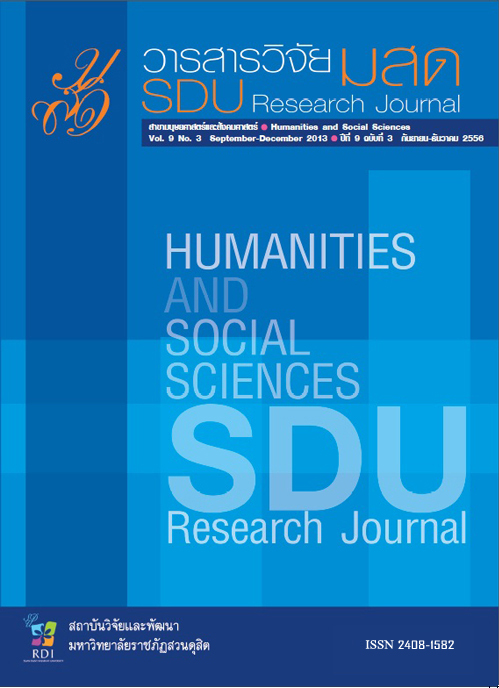ปัจจัยที่ส่งผลต่อพัฒนาการสุขภาวะทางจิตของนักศึกษาระหว่างการฝึกประสบการณ์วิชาชีพครู: การวิเคราะห์โดยโมเดลโค้งพัฒนาการที่มีตัวแปรแฝง
Keywords:
สุขภาวะทางจิต, โมเดลโค้งพัฒนาการที่มีตัวแปรแฝงAbstract
บทคัดย่อ
การวิจัยครั้งนี้มีวัตถุประสงค์เพื่อพัฒนาและตรวจสอบความตรงของโมเดลโค้งพัฒนาการที่มีตัวแปรแฝงสุขภาวะทางจิตของนักศึกษาฝึกประสบการณ์วิชาชีพครูกับข้อมูลเชิงประจักษ์ รวมถึงวิเคราะห์ปัจจัยที่ส่งผลต่อพัฒนาการสุขภาวะทางจิต กลุ่มตัวอย่างในการวิจัยเป็นนักศึกษาครูชั้นปีที่ 5 ที่ออกฝึกประสบการณ์วิชาชีพครูครั้งแรกในภาคต้น ปีการศึกษา 2554 โดยใช้การสุ่มมหาวิทยาลัยที่เป็นกลุ่มตัวอย่างด้วยวิธีการสุ่มอย่างง่าย มีขนาดกลุ่มตัวอย่างทั้งสิ้น 2,070 คน จากมหาวิทยาลัยจำนวน 18 แห่งทั่วประเทศ เก็บข้อมูลจำนวน 5 ครั้ง ระยะห่างครั้งละประมาณ 2 เดือน เครื่องมือที่ใช้เป็นแบบสอบถามแบบมาตรประเมินค่า 5, 7 และ 9 ระดับ วิเคราะห์ข้อมูลด้วยสถิติพื้นฐาน การวิเคราะห์ความแปรปรวนทางเดียวแบบวัดซ้ำ การวิเคราะห์การถดถอยเชิงเส้นแบบโค้งและการวิเคราะห์โมเดลโค้งพัฒนาการที่มีตัวแปรแฝง ด้วยโปรแกรม SPSS และ Mplus 7
ผลการวิจัยสรุปได้ดังนี้
1. โมเดลโค้งพัฒนาการที่มีตัวแปรแฝงสุขภาวะทางจิตของนักศึกษาฝึกประสบการณ์วิชาชีพครูมีความสอดคล้องกลมกลืนกับข้อมูลเชิงประจักษ์ โดยมีรูปแบบพัฒนาการแบบไม่ใช่เส้นตรง มีค่าเฉลี่ยสถานะเริ่มต้นเท่ากับ 5.229 และมีค่าเฉลี่ยอัตราพัฒนาการ เท่ากับ 0.122
2. ปัจจัยสำคัญที่ส่งผลต่อค่าสถานะเริ่มต้นสุขภาวะทางจิตอย่างมีนัยสำคัญทางสถิติ ได้แก่ ตัวแปรกลวิธีการเผชิญปัญหาแบบหลีกหนี บุคลิกภาพมิติความไม่มั่นคงทางอารมณ์ และความสามารถในการปฏิบัติงานครู ปัจจัยที่ส่งผลต่ออัตราพัฒนาการสุขภาวะทางจิตอย่างมีนัยสำคัญทางสถิติ ได้แก่ ตัวแปรกลวิธีการเผชิญปัญหาแบบหลีกหนี บุคลิกภาพมิติความไม่มั่นคงทางอารมณ์ ความสามารถในการปฏิบัติงานครู การสนับสนุนทางสังคมจากครูพี่เลี้ยง และอาจารย์นิเทศก์ ทั้งนี้ ตัวแปรทำนายในโมเดลสามารถอธิบายความแปรปรวนในค่าสถานะเริ่มต้นและอัตราพัฒนาการสุขภาวะทางจิต ได้ร้อยละ 50.6 และ 17.8 ตามลำดับ
คำสำคัญ:สุขภาวะทางจิต โมเดลโค้งพัฒนาการที่มีตัวแปรแฝง
Abstract
The purposes of this research were 1) to develop and validate the latent growth curve model of psychological well-beinggrowth of student teachers during theirprofessional teaching practiceand 2)to analyze the factors that effected their psychological
well-beinggrowth. The sample consisted of 2,070 fifth year student teacherswho had
practiced in professional teaching, selected by sample random sampling from 18 universities in Thailand, each cohort obtained for 5 point in time with 2 month interval. The five, seven and nine point Likert scale were used. The data analysis employed descriptive statistics, repeated-measure analysis of variance, curve -estimation regression analysis, and LatentGrowth Curve Model: LGCM testing by SPSS and Mplus 7. The findings were as follows.
1) The latent growth curve model of psychological well-being of student teachersfitted with empirical data and indicated that nonlinearity in the growth curve. The mean initial statusand growth rate were 5.229 and 0.122, respectively.
2) The substantial covariate factor effecting on initial status ofpsychological well-being wereavoidance copingstrategies, personality trait of neuroticism, and teacher efficacy. The substantial covariate factor effecting on growth rate ofpsychological well-beingwere avoidancecopingstrategies, personality trait of neuroticism, teacher efficacy, social support from cooperating teachers and supervisors. The covariates explained the variance of the initial status and growth rate ofpsychological well-being with the percentages of 50.6 and 17.8, respectively.
Keywords: Psychological well-being, Latentgrowth curve model







